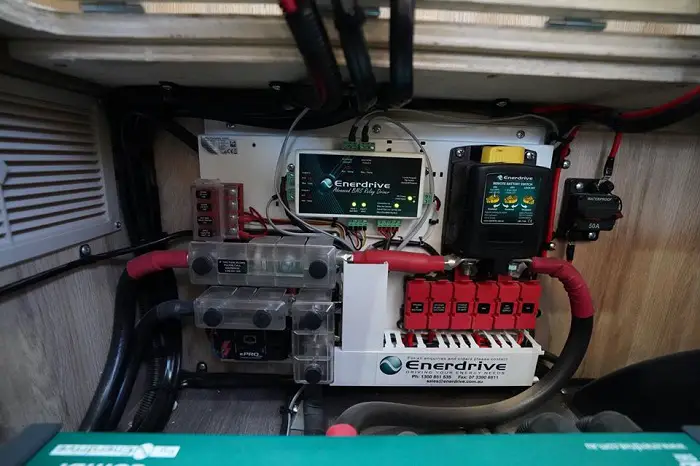While on the road, you may need to power your fridge with a car battery since you cannot access shore line electricity. However, most fridges are 120V and the battery is normally 12V. So, you will need an inverter to enable your fridge get powered by the car battery.
So, how long will a 12 volt battery run a refrigerator? A car battery can power a fridge for about 12 hours with an assumption you are running the fridge only.
Furthermore, the hours the battery can support your fridge will depend with the current state of the battery such as the amount of charge it has, the environmental temperature (low power consumption in cold weather and more power use in hot weather), and the model of the fridge.
The car battery has about 60 AH capacity that is supplying 720 watthours. A small fridge may consume 100W to keep running and if perhaps you do not open the door often it may consume 50 W.
Say, the inverter works at 85% efficiency then the battery power converted will be 600WH. So, the fridge can run for about 12 hours.
However, use the car battery to power the fridge only if need be. Otherwise, running the fridge on car battery will more frequently drain out all charge to zero more often and your battery may get destroyed in the long run. You can also use propane to run an RV fridge if designed to use it.
Although sometimes you may be forced to run a fridge with car battery during emergency such as complete power outage or during a natural disaster. Watch this video and see how to power your fridge with a car battery.
Do I Need Dual Batteries for a Fridge?
Not really. It is not a must to have a dual batteries for a fridge. You can just use that one battery in the RV by having a 12 volt socket located near the fridge but expect fast draining of the battery. Besides, you can also run your RV without batteries.
However, you may need to consider how you connect the fridge to the battery since the circuitry will determine whether or not the fridge will be on or off when the engine is ignited.
I mean, if the 12 volt power supply gets wired through the ignition then expect the fridge to shut down as soon as the engine is turned off. Besides, if the connection does not pass through the ignition meaning the fridge will be on continuously even when the engine is off then expect your battery to run flat easily.
In the latter case you may need a dual system since the next time you wish to embark on a trip you may find your battery flat. Thus, one of the battery can act as a back-up.
Beside, whether or not to have a dual battery system will depend on the food you are storing in the fridge and how well you manage power such as limiting opening fridge door more often.
So, is a dual battery system worth it?
Yes. Dual battery will provide one battery dedicated to act as a starting battery for your RV engine, and the other battery dedicated to power other 12 volt devices in the RV including your fridge.
If possible, I highly recommend you go for a dual battery system for your RV. The system prevents your from getting surprises of low battery with a single battery.
Besides, dual system provides more power that can last longer to power your devices. Unlike with a single battery you are limited to the number of devices you can connect to the battery.
Whenever you intend to purchase a dual battery system keep in mind the budge you can comfortably work with, the period you intend to run the fridge, the period between recharging, and the place you intend to install the battery (in cab, under bonnet, in tray, or in camper/caravan trailer).
Other than the dual system, you may consider using other source of power to power the fridge such as the solar and the generator. The cost of running should be factored in including the climatic conditions since solar is highly dependent on sunshine to be able to run.
How Many Amps Does it Take to Run a Refrigerator?
A 120V refrigerator consumes about 5-8 amps while running. To be sure, check at the back end of your refrigerator next to the compressor your will find the exact wattage your fridge draws for you to be able to compute the wattage.
A common refrigerator may draw 725 watts. So, to compute the amps simply divide the wattage to the fridge voltage. 725/120=6. Such a fridge will consume 6 amps.
To make the fridge energy efficient, purchase energy efficient model and also limit frequent opening of fridge door unnecessarily.
Is It Ok to Leave YOUR Fridge Plugged in 24/7?
Yes. As long as the fridge is leveled it can stay plugged in 24/7. The only thing that can wear off is the electrical element that you may need to replace. Actually, frequently turning on and off the refrigerator is what can cause damages.
Fridge consumes more power to start up but running power is low and much constant. Frequent powering off the fridge can easily cause failures in the tubing system or devices that controls the fridge cycles. So, power off the fridge if you intend not to use it for an extended period of time.
Similarly, learn more on whether or not you should leave your RV water heater on 24/7.
How Many Solar Panels Do I Need to Run a Fridge?
It will depend with several factors that ought to be considered. Although, in general you may need about four or less and sometimes. You can even use just one panel. Some of the factors to consider include:
Your budget
Initial cost for solar panels is expensive. It needs a high investment.
1. Fridge size
A high capacity fridge consumes more power
2. Number of appliances to be connected
Number of appliances you will connect to the solar will affect the choice of solar system. The more the items to connect the more panels or perhaps a high capacity panel you need
3. Energy conservation
If you conserve energy such as limiting the times of opening the fridge door then you may need fewer panels
As long as you are in a place where sunshine is not a problem then solar panel system would do you lots of justice making you spend less in electricity bills. The panels provide electricity enough to power various systems depending with its size.
For example, a single high efficient solar panel can produce about 265 watts of power. Let’s convert it to kWh in a month the panel can produce 30kWh.
In the United States, an average refrigerator consumes about 57kWh per month, and a freezer consumes about 58kWh per month making a total of 115kWh.
Remember one panel supplies 30kWh per month. So, to be able to supply 115kWh per month we require about 3.8 solar panels, so that is 4 of the panels.
Besides, the 4 panels should be sufficient to also power other small devices since you will be traversing a high sunlight areas.

